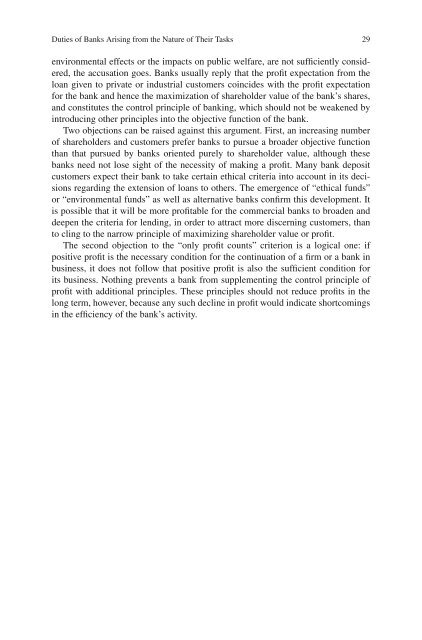The Ethics of Banking: Conclusions from the Financial Crisis (Issues ...
The Ethics of Banking: Conclusions from the Financial Crisis (Issues ...
The Ethics of Banking: Conclusions from the Financial Crisis (Issues ...
You also want an ePaper? Increase the reach of your titles
YUMPU automatically turns print PDFs into web optimized ePapers that Google loves.
Duties <strong>of</strong> Banks Arising <strong>from</strong> <strong>the</strong> Nature <strong>of</strong> <strong>The</strong>ir Tasks 29<br />
environmental effects or <strong>the</strong> impacts on public welfare, are not sufficiently considered,<br />
<strong>the</strong> accusation goes. Banks usually reply that <strong>the</strong> pr<strong>of</strong>it expectation <strong>from</strong> <strong>the</strong><br />
loan given to private or industrial customers coincides with <strong>the</strong> pr<strong>of</strong>it expectation<br />
for <strong>the</strong> bank and hence <strong>the</strong> maximization <strong>of</strong> shareholder value <strong>of</strong> <strong>the</strong> bank’s shares,<br />
and constitutes <strong>the</strong> control principle <strong>of</strong> banking, which should not be weakened by<br />
introducing o<strong>the</strong>r principles into <strong>the</strong> objective function <strong>of</strong> <strong>the</strong> bank.<br />
Two objections can be raised against this argument. First, an increasing number<br />
<strong>of</strong> shareholders and customers prefer banks to pursue a broader objective function<br />
than that pursued by banks oriented purely to shareholder value, although <strong>the</strong>se<br />
banks need not lose sight <strong>of</strong> <strong>the</strong> necessity <strong>of</strong> making a pr<strong>of</strong>it. Many bank deposit<br />
customers expect <strong>the</strong>ir bank to take certain ethical criteria into account in its decisions<br />
regarding <strong>the</strong> extension <strong>of</strong> loans to o<strong>the</strong>rs. <strong>The</strong> emergence <strong>of</strong> “ethical funds”<br />
or “environmental funds” as well as alternative banks confirm this development. It<br />
is possible that it will be more pr<strong>of</strong>itable for <strong>the</strong> commercial banks to broaden and<br />
deepen <strong>the</strong> criteria for lending, in order to attract more discerning customers, than<br />
to cling to <strong>the</strong> narrow principle <strong>of</strong> maximizing shareholder value or pr<strong>of</strong>it.<br />
<strong>The</strong> second objection to <strong>the</strong> “only pr<strong>of</strong>it counts” criterion is a logical one: if<br />
positive pr<strong>of</strong>it is <strong>the</strong> necessary condition for <strong>the</strong> continuation <strong>of</strong> a firm or a bank in<br />
business, it does not follow that positive pr<strong>of</strong>it is also <strong>the</strong> sufficient condition for<br />
its business. Nothing prevents a bank <strong>from</strong> supplementing <strong>the</strong> control principle <strong>of</strong><br />
pr<strong>of</strong>it with additional principles. <strong>The</strong>se principles should not reduce pr<strong>of</strong>its in <strong>the</strong><br />
long term, however, because any such decline in pr<strong>of</strong>it would indicate shortcomings<br />
in <strong>the</strong> efficiency <strong>of</strong> <strong>the</strong> bank’s activity.

















